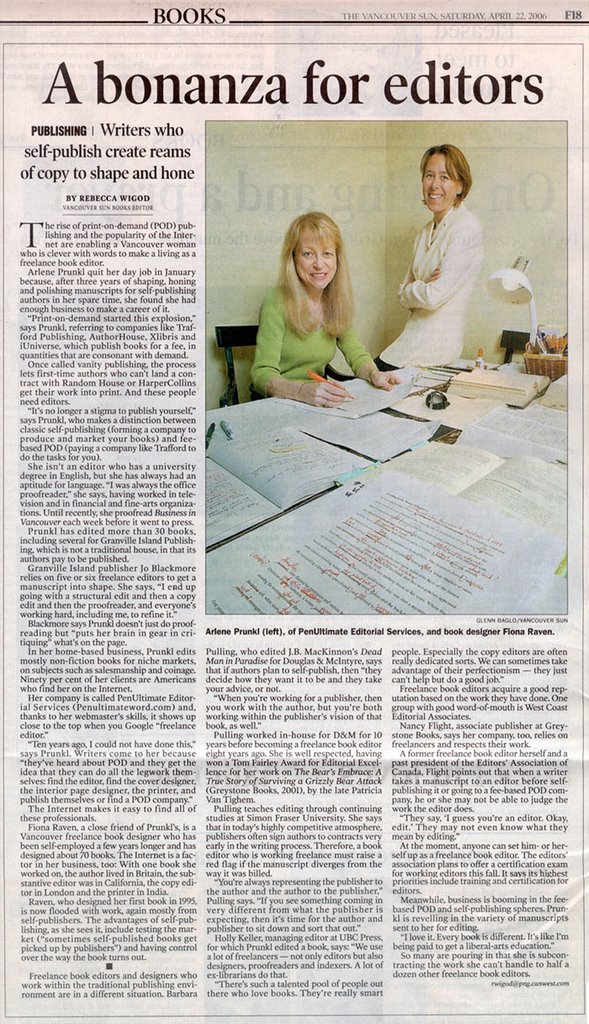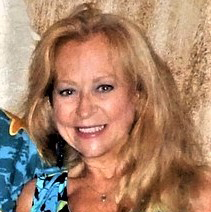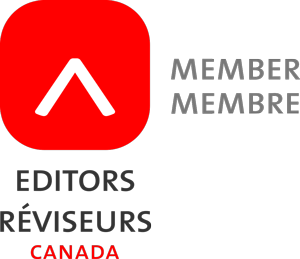
In 2006, after I’d been editing books for almost four years, I was interviewed by Rebecca Wigod, editor of the Books section of the Vancouver Sun newspaper. She subsequently wrote the following article featuring me and my colleague, book designer Fiona Raven. It was published Saturday, April 22, 2006. Here is the text of the article:
The rise of print-on-demand (POD) publishing and the popularity of the Internet are enabling a Vancouver woman who is clever with words to make a living as a freelance book editor.
Arlene Prunkl quit her day job in January because, after three years of shaping, honing and polishing manuscripts for self-publishing authors in her spare time, she found she had enough business to make a career of it.
“Print-on-demand started this explosion,” says Prunkl, referring to companies like Trafford Publishing, AuthorHouse, Xlibris and iUniverse, which publish books for a fee, in quantities that are consonant with demand.
Once called vanity publishing, the process lets first-time authors who can’t land a contract with Random House or HarperCollins get their work into print. And these people need editors.
“It’s no longer a stigma to publish yourself,” says Prunkl, who makes a distinction between classic self-publishing (forming a company to produce and market your books) and fee-based POD (paying a company like Trafford to do the tasks for you).
She isn’t an editor who has a university degree in English, but she has always had an aptitude for language. “I was always the office proofreader,” she says, having worked in television and in financial and fine-arts organizations. Until recently, she proofread Business in Vancouver each week before it went to press.
Prunkl has edited more than [40] books, including several for Granville Island Publishing, which is not a traditional house, in that its authors pay to be published.
Granville Island publisher Jo Blackmore relies on five or six freelance editors to get a manuscript into shape. She says, “I end up going with a structural edit and then a copy edit and then the proofreader, and everyone’s working hard, including me, to refine it.”
Blackmore says Prunkl doesn’t just do proofreading but “puts her brain in gear in critiquing” what’s on the page.
In her home-based business, Prunkl edits mostly non-fiction books for niche markets, on subjects such as salesmanship and coinage. Ninety per cent of her clients are Americans who find her on the Internet.
Her company is called PenUltimate Editorial Services (www.penultimateword.com) and, thanks to her webmaster’s skills, it shows up close to the top when you Google “freelance editor.”
“Ten years ago, I could not have done this,” says Prunkl. Writers come to her because “they’ve heard about POD and they get the idea that they can do all the legwork themselves: find the editor, find the cover designer, the interior page designer, the printer, and publish themselves or find a POD company.”
The Internet makes it easy to find all of these professionals.
Fiona Raven, a close friend of Prunkl’s, is a Vancouver freelance book designer who has been self-employed a few years longer and has designed about 70 books. The Internet is a factor in her business, too: With one book she worked on, the author lived in Britain, the substantive editor was in California, the copy editor in London and the printer in India.
Raven, who designed her first book in 1995, is now flooded with work, again mostly from self-publishers. The advantages of self-publishing, as she sees it, include testing the market (“sometimes self-published books get picked up by publishers”) and having control over the way the book turns out.
* * *
Freelance book editors and designers who work within the traditional publishing environment are in a different situation. Barbara Pulling, who edited J.B. MacKinnon’s Dead Man in Paradise for Douglas & McIntyre, says that if authors plan to self-publish, then “they decide how they want it to be and they take your advice, or not.
“When you’re working for a publisher, then you work with the author, but you’re both working within the publisher’s vision of that book, as well.”
Pulling worked in-house for D&M for 10 years before becoming a freelance book editor eight years ago. She is well respected, having won a Tom Fairley Award for Editorial Excellence for her work on The Bear’s Embrace: A True Story of Surviving a Grizzly Bear Attack (Greystone Books, 2001), by the late Patricia Van Tighem.
Pulling teaches editing through continuing studies at Simon Fraser University. She says that in today’s highly competitive atmosphere, publishers often sign authors to contracts very early in the writing process. Therefore, a book editor who is working freelance must raise a red flag if the manuscript diverges from the way it was billed.
“You’re always representing the publisher to the author and the author to the publisher,” Pulling says. “If you see something coming in very different from what the publisher is expecting, then it’s time for the author and publisher to sit down and sort that out.”
Holly Keller, managing editor at UBC Press, for which Prunkl edited a book, says: “We use a lot of freelancers – not only editors but also designers, proofreaders and indexers. A lot of ex-librarians do that.
“There’s such a talented pool of people out there who love books. They’re really smart people. Especially the copy editors are often really dedicated sorts. We can sometimes take advantage of their perfectionism – they just can’t help but do a good job.”
Freelance book editors acquire a good reputation based on the work they have done. One group with good word-of-mouth is West Coast Editorial Associates.
Nancy Flight, associate publisher at Greystone Books, says her company, too, relies on freelancers and respects their work.
A former freelance book editor herself and a past president of the Editors’ Association of Canada, Flight points out that when a writer takes a manuscript to an editor before self-publishing it or going to a fee-based POD company, he or she may not be able to judge the work the editor does.
“They say, ‘I guess you’re an editor. Okay, edit.’ They may not even know what they mean by editing.”
At the moment, anyone can set him- or herself up as a freelance book editor. The editors’ association plans to offer a certification exam for working editors this fall. It says its highest priorities include training and certification for editors.
Meanwhile, business is booming in the fee-based POD and self-publishing spheres. Prunkl is reveling in the variety of manuscripts sent to her for editing.
“I love it. Every book is different. It’s as though I’m being paid to get a liberal-arts education.”
So many are pouring in that she is subcontracting the work she can’t handle to half a dozen other freelance book editors.
rwigod@png.canwest.com


